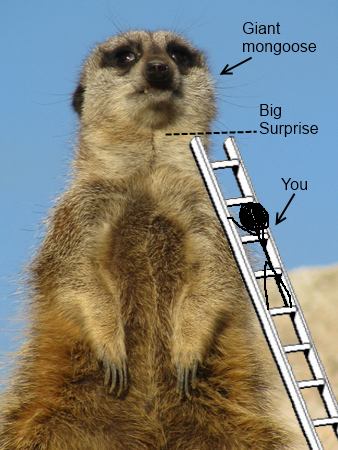I know a lot of people that are working very, very hard in jobs that they don’t have any particular passion for (and in many cases dislike quite a bit) in order to have greater “option value.” I was one of them; I spent the majority of the last 10 years building option value.
As we come closer to the time we originally thought we’d end this Career Break, I’ve started to think about the future and my career again. I’ve started to think about “option value” – how much I’ve accumulated and what I should do with it. If I were to write a management book about option value it would look something like the following.
It will not apply to everyone.
Sometimes “option value” is about building a great resume…
It starts young. You don’t even know it’s happening. All you know is that you have to work very hard in high school to get into the right university. You don’t question it, you just know it’s what you’re supposed to do. Everyone knows it–and those that disagree just have wrong-minded priorities (e.g., fun). You know better.
Once in college, you have to make sure you choose the right major, get the right grades, do the right internships and demonstrate the right leadership qualities in order to get the right job after graduation. If you are in pursuit of option value, determining which job is the “right” one involves very little reflection upon what you enjoy doing or what makes you happy; instead, it requires seeking out the jobs that are hardest to get, the hardest to do and the most likely to consume the vast majority of your waking hours. This is obvious.
Of course, this job is just the first such job; the whole reason you worked so hard to get it is so that you would be qualified for the next job. That’s the “option value.” There is always a next job/accomplishment/promotion/whatever–otherwise, why would you be working so hard at the current job which you barely even like? If you weren’t doing it in order to get the next job, it would be a little crazy, wouldn’t it?
Each new job will likely be harder than the last. If you’re focused on pursuing “option value,” you will likely inadvertently have become convinced that any job that would be hard and/or painful is automatically worthwhile and important; also, you’ll likely believe that any job that looks easy and/or fun is almost certainly frivolous and a waste of time. Obviously, this makes sense, even though it is sometimes hard to explain to others in a way that they can understand–fear not, this is likely due to their wrong-minded priorities (e.g., happiness).
This logic will force you to continually seek out the path of greatest resistance and push yourself as hard as you can to get “there.” The destination is irrelevant; it’s the very fact that there is resistance that makes it seem worthwhile. In other categories of your life you likely don’t have the same confusion–for example, you may fully agree that walking through an open doorway is a much better idea than trying to walk through a brick wall–but for some reason this logic gets reversed in regards to your career. We’ll refer to this as “Brick Wall Syndrome, ” or simply BWS.

Watch out for "Irritable Brick Wall Syndrome", that's even worse.
Most people fail or drop out at some point in this process–which is understandable, as it requires near-perfection as well as a fair degree of luck to navigate the course. The longer you go without a failure, the greater the pressure to be perfect all the time and the more (it feels) you have to lose. Unfortunately, being perfect gets harder and harder. The further up this ladder you climb, the more years and vitality it extracts from you and the harder it is to remember what you were doing it for to begin with. On a positive note, with each new accomplishment you earn an entirely new set of options for the future. After 5 years of this intensity you have quite a bit of “option value;” after 10 you could do almost anything. Imagine if you did it for 20 years – someday you’ll be able to do all of those things you always wanted to do – not today, but someday . . .
Sometimes it’s about accumulating money and/or stuff…
This often looks similar to the scenario above. It often layers on top of the scenario above. Having money has real benefits:
- You can afford to buy products and services that free up time (e.g., car, take-out dinners, Roomba). There are lots of things you can do with more time. Things like looking for more brick walls.
- You can spend money on stuff to reward yourself for your accomplishments and to prove to others that you are “succeeding” (e.g., houses, watches, monster trucks). Unfortunately, spending it on these things along the way requires earning even more to pay for them. That said, the value of owning a monster truck should not be underestimated.
- You can even save money so that someday you won’t have to work so hard and you can finally afford to go out and do all of those things you always wanted to do. I guess.
While it is not entirely the same thing, there is no denying that more money = more “option value.” And, you can always have more; someone else always does (we refer to them as “jerks”).
Options don’t kill people, people kill people…
There is absolutely a place for pursuing “option value” and many benefits can come from it. It can indeed get you where you want to go. . . as long as you know where that is. The thing is, you don’t really need 1,000 options, you probably only really want 5. And if you only really want 5, why spend so much time building the other 995? The trick is figuring out which 5 you want and minimizing the amount of time spent accumulating those you don’t care about.
For example, let’s say I want to go on an island vacation. It would probably make sense for me to figure out which island I want to go to, buy a ticket and go. Right? Alternatively, I could put off reflecting on where exactly to go and instead work really hard for several years to save up enough money to buy tickets to 20 different island destinations (just in case the first one doesn’t turn out to be perfect). I still won’t have gone to any islands over these years, but I will now have several to choose from and at least I won’t be sunburnt. Note: I tried really hard to come up with a funnier example for this analogy. I failed (see below, failure can be a good thing).
Pursuing options merely for the sake of having more options is not often a recipe for long-term happiness. It’s all too easy to get caught up in this cycle–especially when you are working so hard to get to the next set of options that you don’t allow yourself time to reflect upon where you are headed or what is on top of the particular ladder you are climbing–be careful, it could be an angry mongoose.

Worse, it could be a giant mongoose. BWS sucks.
One way to break the cycle…
Seek out failure. Failing early is better. Anything is better than running into an angry mongoose on top of a ladder. It’s much easier to succeed if you’re already a failure–and much harder to avoid failing if you are exclusively a succeeder. Most happy people I know have had significant failures. Few happy people that I know are pursuing options for the sake of options (though, they may have monster trucks someday so you should still be friends with them just in case).
Failure teaches you that it’s ok to fail (if this seems obvious, great–if not, be careful, you may be suffering from BWS). Failure often leads to new perspective and a more open mind regarding what “success” can look like. Indeed, failing at what you think you are “supposed to” do may open the door to pursuing what you actually “want to” do. Weird.
Don’t spend all of your time and energy getting stressed about avoiding/fearing failure (a prime symptom of BWS). Instead, embrace it–it can be more fun that you might think.
Now what?
If you’re working hard on something you don’t love in order to build “option value,” always know why you are doing it and how you plan to “cash in” on those options. You get to choose why and how, but choose. Choose something that inspires you and work specifically towards it. It doesn’t matter what you pick (e.g., travel, time with family, volunteering, ninja training course, etc.). There is no right answer and you can (and should) change it as many times as you want. The important thing is picking something specific rather than just marching forward without a destination–if you don’t choose, the angry mongeese will choose for you and you definitely aren’t going to like what they choose (it will probably be something scary, they eat snakes).

With them in charge, what could go wrong?? (Note: I am fairly confident that the $2 I paid for this photo is the best $2 I have ever spent)
Once you pick something that inspires you, it’s time to ask yourself when. How much ‘option value’ and which options do you need to pull it off? How much money? Be specific. You might be surprised. You might have more than you need already. It might be time to cash in–you can always create more options later. Plus, who knows what new ones you’ll find along the way…

Maybe you'll be able to pull this off
Wasn’t that a nice inspirational note to end on?
Note: The author makes no claim whatsoever to have figured anything important out or to have anything worthwhile to say about this or any other topic. He writes things like this merely for entertainment purposes–mostly his own. You should definitely not construe this as advice or take action based on it–you could end up unemployed in Chile.
Update: If you liked this, you may enjoy Chapter 2: Perfectionists should kick themselves in the head (perfectly)





